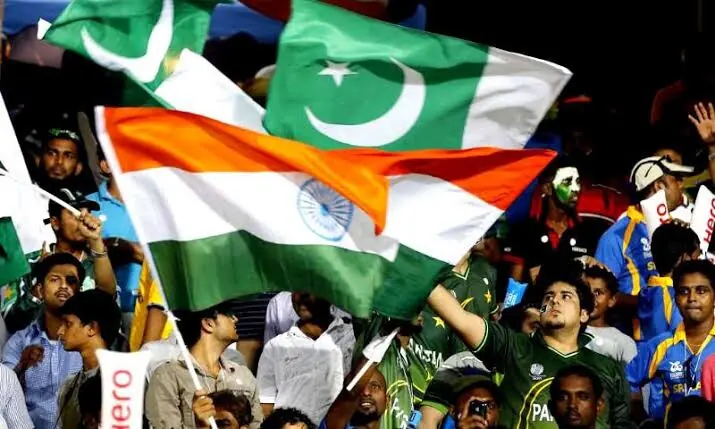DUBAI: Could the Indian government’s own sports policy hold the key to reviving the most watched, most lucrative and most emotionally charged rivalry in Test cricket — Pakistan versus India?
Upon reviewing India’s Ministry of Youth Affairs and Sports’ policy on international events, a key clause stands out: “Indian teams and individual players will take part in international events that also have teams or players from Pakistan. Similarly, Pakistani players and teams will be able to participate in such multilateral events hosted by India.”
Another important line states: “About international and multilateral events, in India or abroad, we are guided by the practices of international sports bodies and the interest of our own sportspersons.”
Taken together, the policy is clear: bilateral series remain off-limits, but participation in international and multilateral events is allowed, and India defers to the practices of international sports bodies — in this case, the International Cricket Council (ICC).
This is why the two sides still face each other in ICC World Cups, ICC Champions Trophy, and ACC Asia Cups. So why not in the ICC World Test Championship (WTC)?
Currently, the ICC WTC league stage is organised on a bilateral basis, with each of the nine participants choosing six opponents over the two-year cycle — three at home and three away — subject to agreement between boards. Each board arranges fixtures, hosts matches and retains all revenues. The ICC’s role is limited to providing the points system, playing conditions, rules, branding and appointing match and anti-corruption officials.
While this flexibility gives members freedom to shape their calendars, it also means India can simply omit Pakistan from its selection, keeping the rivalry outside the Championship.
Because the ICC WTC fixtures are scheduled and commercialised bilaterally — even though they sit inside an ICC competition — India can contend these are not “multilateral” under its policy.
Unlike the ICC WTC final, the solution does not require the ICC to take over complete match operations or host revenues. The ICC should formally designate the WTC league stage as an ICC event for governance and compliance purposes — competition regulations, branding and non-negotiable fixture obligations — while leaving match operations and all host-board revenues untouched.
Once that happens, matches would not only be classified as ICC events but India’s sports policy would apply, obliging participation. Also, host boards will continue to stage matches and retain revenues while the the ICC enforces compliance and safeguards the competition.
India’s policy — which explicitly defers to international sports bodies — places the onus on the ICC. If the ICC defines the WTC as a true multilateral event, India would be obliged under its own stated policy to participate, including fixtures against Pakistan. Ownership here is administrative and legal, not operational or financial.
The absence of India-Pakistan Tests has left the ICC WTC lopsided and deprived the format of its most compelling contest. A revival would not only balance the competition but also electrify the Championship for fans; in turn, lifting global viewership and sponsorship. Moreover, it will give players a stage to compete in the traditional format and strengthen the ICC’s credibility and reputation in protecting and promoting Test cricket.
The precedent already exists. The Ashes is protected within every ICC WTC cycle, guaranteeing that Australia and England meet home and away regardless of scheduling pressures. There is no structural reason why the same principle could not apply to India and Pakistan once the WTC is elevated to a fully recognised ICC event.
Some will argue that politics, not policy, has always dictated whether India and Pakistan play. True — but the same policy also states that India will take part in international events that include Pakistan. Once the ICC WTC league is formally designated as an ICC event with non-negotiable fixtures, the default is participation; any deviation would require an explicit policy exception rather than ambiguity.
Series logistics are manageable, even if at present the environment is not conducive for the two to host each other. Neutral venues such as the UAE or England have successfully hosted both nations, and several boards have publicly expressed interest in staging Pakistan-India Tests.
The ICC has already branded, officiated and regulated the WTC. It does not need to organise or run matches — it simply needs to make the league stage a fully recognised ICC event under its authority.
Every ICC leader has left a mark: David Richards started the ICC Champions Trophy (previously known as the ICC Knock-Out); Malcolm Speed launched the T20 World Cup; Haroon Lorgat introduced technology in world cricket; David Richardson standardised technology and planted the ICC WTC seed; and Geoff Allardice put wheels to the ICC WTC and spearheaded cricket’s return to the Olympics.
Sanjog Gupta, the ICC’s new Chief Executive, now has the chance to build his own legacy by ensuring the Pakistan-India Test rivalry is restored under ICC authority, without disrupting host boards’ operations or revenues.
The bottom line remains that India and Pakistan haven’t played a Test since the 2007 three-match series in India. However, if these two powerhouses of cricket can generate millions in revenue by playing in ICC-organised ODIs and T20Is, there is no logical reason to deny them a Test series — the game’s purest format.
The ICC World Test Championship is the perfect stage to finally deliver the ultimate India-Pakistan series. To secure the survival and growth of Test cricket, and protect the integrity of its marquee competition, the ICC must think boldly, own the WTC and act decisively.
The writer is a former DAWN staffer and has held top positions in the media and communications departments of both the ICC and PCB.

